Glendale Armenians in shadows of the past
- 1 October 2016
- US Election 2016
 GETTY IMAGES
GETTY IMAGES
The desolate landscape is a study in shades of red. Fine dust covers the ground. In the distance, dark mountains rise on the horizon. Except for the pale sky, it could be a scene from the surface of Mars.
Arthur Charchian stands in the middle of this barren wasteland and explains that, but for fate's mercy, his ancestors could have died here.
Except "here" isn't the desert of Deir ez-Zor, in what is now eastern Syria, the place where hundreds thousands of Armenians perished while fleeing their ancestral homeland a century ago.
Mr Charchian is in a room at the centre of a temporary exhibit on Armenian history at the Brand Museum in Glendale, California - a memorial to a bitter chapter in the history of a people.
The exhibit, which first opened in Mexico City, is called Armenia: An Open Wound. It traces the history of Armenian culture from what they consider their golden age in the 1st Century BC through the great diaspora - when the Armenian people scattered across the globe after being forced from their homes by the Ottoman Empire Turks during World War One.
They settled in nearby parts of the Middle East, in Europe, in New York and as far away as Glendale, a Los Angeles suburb nestled in the Verdugo Mountains, home to the largest Armenian population in the Western world.
There are currently more than 200,000 Armenians living in the greater Los Angeles metropolitan area, and the city of Glendale - with a population that is roughly 30% Armenian - is its beating heart.
A trickle to a wave
Armenians first started arriving in California early in the 20th Century, as a direct result of the unrest in their homeland. They largely worked in the fertile agricultural valley in central California.
A few settled in Glendale. Friends and relatives followed. They founded a church. They opened shops and restaurants that offered the tastes and products of their homeland - including the ubiquitous small cups of thick, dark coffee and sweet, nut-filled pastries.
It's a pattern that has played out time and again in immigrant communities across the US.
What began as a trickle turned into a series of waves - a result of the war and economic disruption in areas the Armenians had subsequently settled. They fled the Iranian revolution in the 1970s, the Lebanese Civil War in the 1980s, the break-up of the Soviet Union in the 1990s, the Iraq War in the 2000s and, in the past few years, the Syrian civil war.
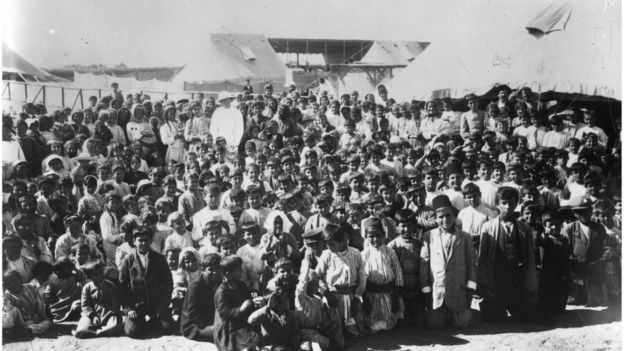 HULTON ARCHIVE
HULTON ARCHIVE
The Armenian community in Los Angeles is a patchwork of immigrants with different reasons for their arrival, different national experiences, all in different stages of assimilation into the American culture.
It includes the Kardashian clan of reality television fame and Tigrana Zakaryan, who is helping to build support for a proposed Armenian American Museum in Glendale; former California Governor George Deukmejian and Ardy Kassakhian, a Glendale city clerk running for a seat in the California legislature.
The experience of Deir ez-Zor unites them, however. It casts a shadow over the Armenian people to this day, and it influences and educates their politics, even in Glendale.
History in a word
Mr Charchian, Mr Zakaryan and other members of Glendale's Armenian community sit in the Brand Museum on a sweltering day in June and explain there is a word that describes what happened to their ancestors in the Deir ez-Zor desert.
Genocide. The wilful attempted eradication of their people at the hands of the Ottoman Turks. They pledge they will not forget - or forgive - until the modern-day Turkish nation acknowledges their suffering, accepts responsibility and makes amends.
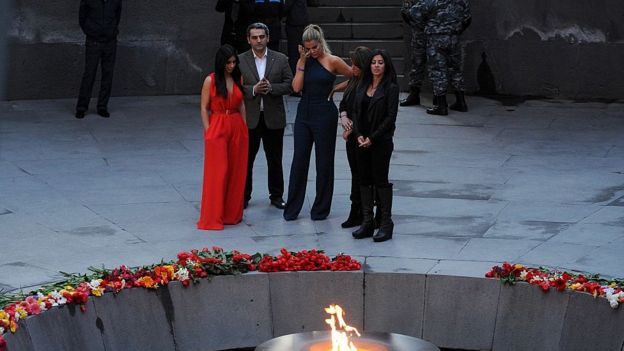 GETTY IMAGES
GETTY IMAGES
"For me, it's very important because my father's family was all killed in the genocide, so I never knew my grandparents; never knew my aunt and uncle," says Zaven Kazazian, who runs a consulting company. "When we are in the United States, we are all Americans. We will do everything for this country. But that does not mean we will ever forget the genocide."
Armenians - in Glendale and around the world - have laboured for decades to convince other nations to use the "genocide" label and apply international pressure on the Turkish government. In June, the German parliament offered such recognition. So far, the United States - wary of upsetting relations with a key Middle East ally - has not. Turkish officials, while acknowledging that many Armenians died, assert that the casualties were the result of armed conflict during a time of political instability and not a systematic attempt at ethnic cleansing.
A wall near the end of the exhibit displays a quote from Barack Obama while he was running for president in 2008.
"I am firmly convinced that the Armenian Genocide is not an allegation, personal opinion or simply a point of view," it reads. "On the contrary, it is a widely documented fact supported by overwhelming historical evidence. The facts are undoubtedly true ... As president I will acknowledge the Armenian Genocide."
As Mr Charchian and the others are quick to point out, that's a promise Mr Obama hasn't kept. Neither has his 2008 Democratic primary opponent, Hillary Clinton, who made similar pledges and served as Mr Obama's secretary of state.
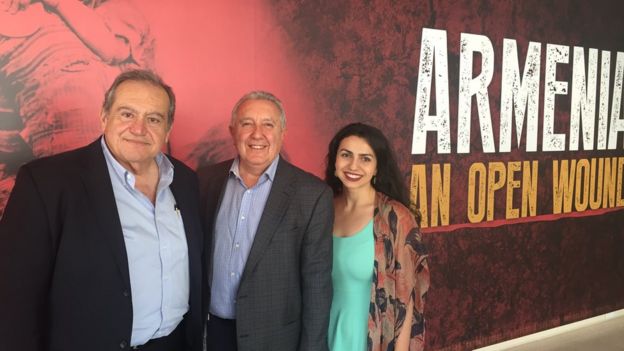 GETTY IMAGES
GETTY IMAGES
It has left Armenians in the US wary of political promises and was part of the reason why the western branch of the Armenian National Committee of America endorsed Vermont Senator Bernie Sanders over Mrs Clinton in California's Democratic 7 June presidential primary.
"We were angry because we believed that Obama was a message of hope, of change," says Berdj Karapetian, head of a Glendale-based healthcare company and chair of the Armenian American Museum that is to be built in Glendale sometime in the coming years.
"It's very difficult when I try to explain to my son, who is 13, that the president is not willing to articulate the word genocide."
'Baffling' connections
The conflict over genocide recognition isn't just a national issue for the Armenians in Glendale, however. It also spills into local politics. Charchian, who works as a lawyer and chairs a business committee with the Southern California Armenian Democrats, says he's considered running for public office but has decided - at least for now - to stay out.
The reason, Mr Charchian says, is that Armenians seeking political office in the Los Angeles area have faced a torrent of negative advertisements funded at a level other candidates haven't faced.
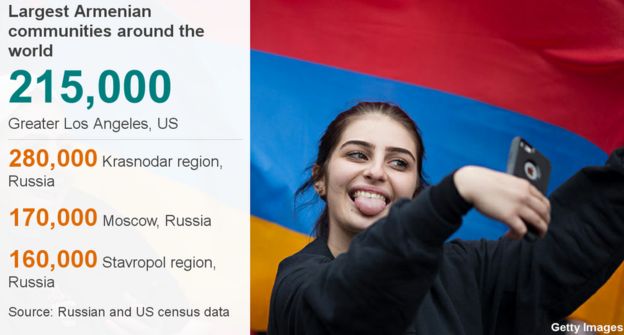
"The attacks would come based on people not knowing me, but only knowing that my last name ends in 'ian'," he says. "It's a disability that we carry as Armenians."
In 2012, for instance, Adrin Nazarian successfully campaigned for a California assembly seat in nearby Sherman Oaks. An opposing independent group, Democrats for Transparency in Democracy, spent nearly $120,000 in direct mailings attacking him.
This year, Ardy Kassakhian is running for a seat representing Glendale. A group called the Parent Teacher Alliance has spent more than $1.2m opposing him - an eye-popping number for a state legislative race.
In both cases, the independent political committees were backed by California Charter Schools Association Advocates, which represents the privately operated, publicly funded schools in California. Here's where nefarious theories of genocide politics creep in.
Karapetian notes that one of the more influential charter school companies in Southern California, Magnolia Public Schools, is funded by Fethullah Gulen, a Turkish cleric who lives in Pennsylvania.
Gulen, who operates schools around the world, is one of the more influential voices in Turkish politics and recently made headlines when he was linked to the recent military coup in Turkey, leading to calls for his extradition. The head of Magnolia now runs the California Charter Schools Association.
"The fact that they're going to a negative message makes a lot of us ask why," Karpetian says. "It baffles a lot of us. We're not happy, but we'll persevere. That's kind of our nature."
Charchian points to a recent march in Los Angeles commemorating the Armenian genocide that drew more than 150,000 people and the community's political clout as important context to consider.
In 2014, for instance, Armenians - including Mr Nazarian - successfully helped push through state legislation mandating public schools teach "genocide education" - including a section on the Armenian experience.
"California is definitely in the eye of a lot of pro-Turkish forces because, as California goes, so goes the rest of the nation," he says.
'Back where they came from'
Ardy Kassakhian got his first taste of politics as a student at UCLA, where he led efforts to block funding of a Turkish studies programme at the university that he said infringed on academic freedom.
"That was offensive, that Turkey would try to buy its way into one of our most hallowed institutions," he says.
Now the Glendale city clerk, in his California state assembly race, says he's facing off against Turkish interests once again, in the form of the million-dollar expenditures against him.
"I'm sure that Turkish contributors to that particular organisation aren't too disappointed in seeing us get pounded," he says. "I was surprised by the amount. But was I surprised that it happened? No."
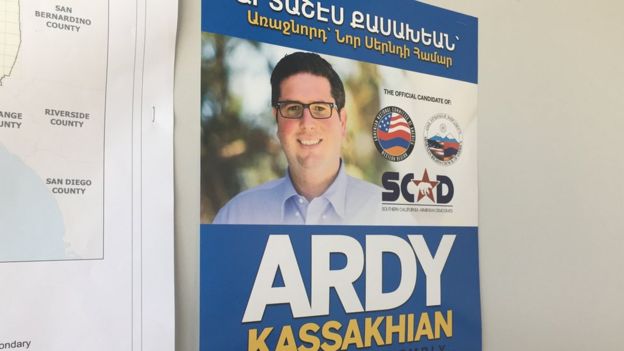 GETTY IMAGES
GETTY IMAGES
Kassakhian has his own deep-pocketed donors, including the teachers' union and real-estate interests.
He is still being vastly outspent, however. And much of the money has gone into negative direct-mail flyers that allege he made ballot-counting errors as clerk (which he denies, citing the results of an internal city audit) and is a closet Republican (which makes him laugh).
"I was a registered Republican between the ages of 18 to 22," says the 39-year-old candidate. Although he says many Armenians used to be Republicans, in part because of the legacy of Governor Deukmejian in the 1980s and the respect Armenian immigrants from the former Soviet Union had for Republican President Ronald Reagan, political trends in the community are heading to the left.
"If you're an Armenian who fled the war in Iraq or the upheaval in the Mid-East, you're more prone to really understand and appreciate the parties who were involved in that," he says. "You're not going to be pro-George W Bush or [his Vice-President] Dick Cheney."
Beyond his concerns over dark money pouring into his race of questionable origins, Mr Kassakhian says he still faces garden-variety discrimination, as well.
"You end up having this in any community or group that's going through the process of acculturating and finding its footing and its political voice," he says. "It's frustrating to me because some of the folks who express an opinion and try to paint me as an outsider - well, I've lived in Glendale longer than they have."
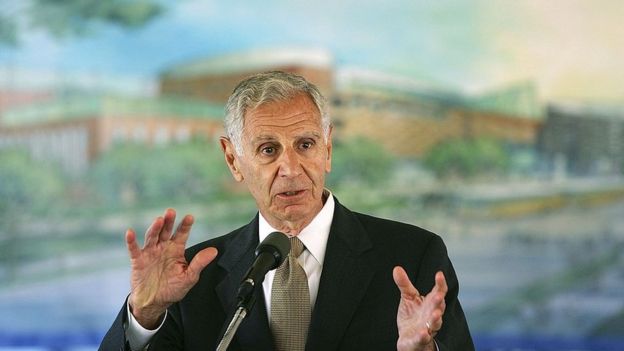 GETTY IMAGES
GETTY IMAGES
Mr Kassakhian says he still keeps a voicemail from when he was running for city clerk in 2005, left by a woman who said Armenians are criminals who should "go back where they came from".
"It's actually refreshing when someone tells you what lies in their heart to your face," he says. "It's more frustrating when they smile, but then behind your back speak in coded terms, like, 'Hey, don't trust Armenians, or don't trust the city clerk who's counting the ballots. He's rigging the election, just like they do back in ... wherever.'"
In the 7 June California primary, Mr Kassakhian finished second behind Laura Friedman, the Glendale city council member who has benefited from the charter school efforts. The two Democrats will face off in the 8 November general election.
A nation on the pitch
A 45-minute drive south of Glendale, and local election battles seem like a distant memory. The Armenia-El Salvador football match in Carson, California - part of a two-game visit by the Armenian national team to commemorate the founding of the first Armenian Republic on May 28, 1918 - is less a sporting match than a celebration of Armenian nationalism and culture.
The first Republic only survived two years, ending with its annexation by the Soviet Union. Upon the Soviet empire's collapse, however, Armenia regained its independence and has been an independent nation since 1990.
For most Armenians in Los Angeles, the visit by the Armenian national team - and its star, Henrikh Mkhitaryan, who currently plays for Manchester United - was the first chance to cheer for their homeland, and they did it with gusto - clad in red Armenian football jerseys, waving orange, red and blue Armenian flags, dancing to Armenian music over the stadium loudspeakers and chanting "Hayastan" - the Armenian word for their nation - throughout the match.
Sylvie and John Chatikachian brought their three children to the game and posed for a family photo, holding a long Armenian football scarf. Sylvie's great-grandparents came from Armenia. John fled to Los Angeles to live with relatives during Lebanon's civil war.
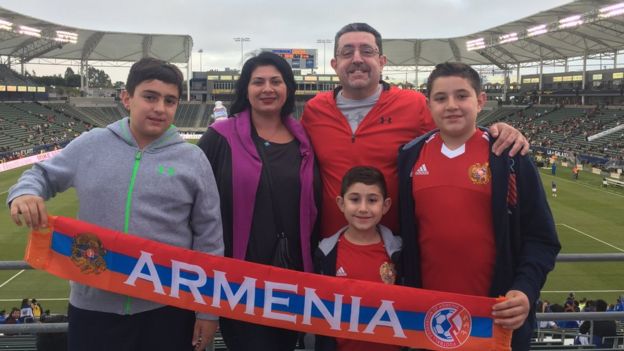
"For two years, every time I heard a loud noise I thought it was an explosion and woke up," he said. "It took a while to get used to."
His story is the Armenian experience on a small scale. His grandparents were forced from their homes by the Turks. His parents grew up in Aleppo, Syria - and he has lost contact with relatives there due to that nation's civil war. Now his family is in California - and although they live in southern Los Angeles, they send their children to an Armenian school in Glendale.
"We want to raise our kids to appreciate the diversity of our culture and what we've learned in the past," she says. "Our Armenian community means everything."


No comments:
Post a Comment